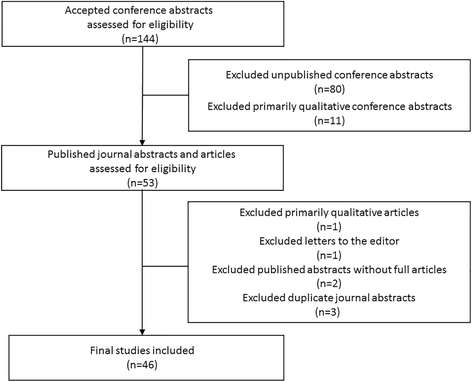Conference presentation to publication: a retrospective study evaluating quality of abstracts and journal articles in medical education research
- PMID: 29121891
- PMCID: PMC5680828
- DOI: 10.1186/s12909-017-1048-3
Conference presentation to publication: a retrospective study evaluating quality of abstracts and journal articles in medical education research
Abstract
Background: There is little evidence regarding the comparative quality of abstracts and articles in medical education research. The Medical Education Research Study Quality Instrument (MERSQI), which was developed to evaluate the quality of reporting in medical education, has strong validity evidence for content, internal structure, and relationships to other variables. We used the MERSQI to compare the quality of reporting for conference abstracts, journal abstracts, and published articles.
Methods: This is a retrospective study of all 46 medical education research abstracts submitted to the Society of General Internal Medicine 2009 Annual Meeting that were subsequently published in a peer-reviewed journal. We compared MERSQI scores of the abstracts with scores for their corresponding published journal abstracts and articles. Comparisons were performed using the signed rank test.
Results: Overall MERSQI scores increased significantly for published articles compared with conference abstracts (11.33 vs 9.67; P < .001) and journal abstracts (11.33 vs 9.96; P < .001). Regarding MERSQI subscales, published articles had higher MERSQI scores than conference abstracts in the domains of sampling (1.59 vs 1.34; P = .006), data analysis (3.00 vs 2.43; P < .001), and validity of evaluation instrument (1.04 vs 0.28; P < .001). Published articles also had higher MERSQI scores than journal abstracts in the domains of data analysis (3.00 vs 2.70; P = .004) and validity of evaluation instrument (1.04 vs 0.26; P < .001).
Conclusions: To our knowledge, this is the first study to compare the quality of medical education abstracts and journal articles using the MERSQI. Overall, the quality of articles was greater than that of abstracts. However, there were no significant differences between abstracts and articles for the domains of study design and outcomes, which indicates that these MERSQI elements may be applicable to abstracts. Findings also suggest that abstract quality is generally preserved from original presentation to publication.
Keywords: Medical education; Medical education–outcomes research; Quality assessment.
Conflict of interest statement
Ethics approval and consent to participate
Not Applicable
Consent for publication
Not Applicable
Competing interests
The authors declare that they have no competing interests.
Publisher’s Note
Springer Nature remains neutral with regard to jurisdictional claims in published maps and institutional affiliations.
Figures
Similar articles
-
Association Between Study Quality and Publication Rates of Medical Education Abstracts Presented at the Society of General Internal Medicine Annual Meeting.J Gen Intern Med. 2015 Aug;30(8):1172-7. doi: 10.1007/s11606-015-3269-7. J Gen Intern Med. 2015. PMID: 25814265 Free PMC article.
-
Publication rates of congress abstracts is associated with abstract quality: Evaluation of Turkish National Medical Education Congresses and Symposia between 2010 and 2014 using MERSQI.BMC Med Educ. 2023 May 30;23(1):394. doi: 10.1186/s12909-023-04383-1. BMC Med Educ. 2023. PMID: 37254136 Free PMC article.
-
An assessment of the methodologic quality of medical education research studies published in The American Journal of Surgery.Am J Surg. 2009 Sep;198(3):442-4. doi: 10.1016/j.amjsurg.2009.01.024. Am J Surg. 2009. PMID: 19716888
-
Conversion rates of abstracts presented at the Urological Society of Australia and New Zealand (USANZ) Annual Scientific Meeting into full-text journal articles.BJU Int. 2012 Aug;110(4):485-9. doi: 10.1111/j.1464-410X.2011.10879.x. Epub 2012 Feb 2. BJU Int. 2012. PMID: 22300438 Review.
-
Analysis and publication rates of Clerkship Directors in Internal Medicine (CDIM) annual meeting abstracts 1995-2005.Teach Learn Med. 2011 Oct;23(4):342-6. doi: 10.1080/10401334.2011.611771. Teach Learn Med. 2011. PMID: 22004319 Review.
Cited by
-
Maximizing the Impact and ROI of Leadership Development: A Theory- and Evidence-Informed Framework.Behav Sci (Basel). 2024 Oct 16;14(10):955. doi: 10.3390/bs14100955. Behav Sci (Basel). 2024. PMID: 39457826 Free PMC article. Review.
-
Gold standard research and evidence applied: The Inspire Nursing Leadership Program.Healthc Manage Forum. 2024 May;37(3):141-150. doi: 10.1177/08404704241236908. Epub 2024 Mar 12. Healthc Manage Forum. 2024. PMID: 38469859 Free PMC article.
-
Leveling the field: Development of reliable scoring rubrics for quantitative and qualitative medical education research abstracts.AEM Educ Train. 2021 Aug 1;5(4):e10654. doi: 10.1002/aet2.10654. eCollection 2021 Aug. AEM Educ Train. 2021. PMID: 34485805 Free PMC article.
-
From Podium to PubMed: Successful Manuscript Publication of Oral Breast Surgery Abstract Presentations at National Meetings from 2017 to 2022.Ann Surg Oncol. 2025 Jul 19:10.1245/s10434-025-17852-2. doi: 10.1245/s10434-025-17852-2. Online ahead of print. Ann Surg Oncol. 2025. PMID: 40684019
-
Self-directed learning assessment practices in undergraduate health professions education: a systematic review.Med Educ Online. 2023 Dec;28(1):2189553. doi: 10.1080/10872981.2023.2189553. Med Educ Online. 2023. PMID: 36919556 Free PMC article.
References
-
- Scherer RW, Langenberg P, von Elm E. Full publication of results initially presented in abstracts. Cochrane Database Syst Rev. 2007;18(2):MR000005. - PubMed
MeSH terms
LinkOut - more resources
Full Text Sources
Other Literature Sources


